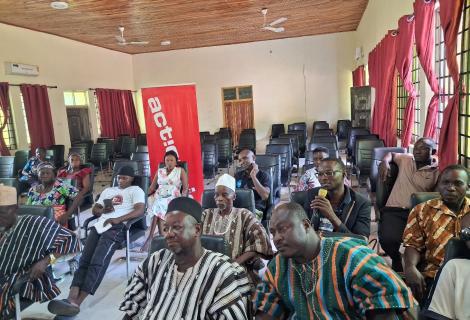ActionAid Ghana Deepens Long-Term Protection of CAPs Forest Restoration Sites Through Community-Driven By-Laws.

As part of efforts to secure the long-term gains of its forest restoration work, ActionAid Ghana has taken a major step toward strengthening community ownership and safeguarding rehabilitated lands across 15 CAPs project communities. Under its sustainability drive, the organization has supported these communities with cashew and grafted mango seedlings planted with technical assistance from the Forestry Services Division and Agricultural Extension Agents to restore degraded landscapes and boost greener livelihood options.
To ensure these restored fields are protected, managed, and sustained beyond the project cycle, ActionAid facilitated a participatory process in which communities drafted and refined local by-laws tailored to their environmental realities. These by-laws were then validated at the district level with technical contributions from key stakeholders including the Justice and Security Committee, Forestry Services Division, Departments of Planning and Agriculture, Ghana National Fire Service, Environmental Health, and NADMO.
The resulting consolidated by-laws address critical issues such as destruction of farms by stray animals, bushfire prevention, illegal tree felling (especially of high-value species), community participation in watering and maintenance schedules, hunting within restored forest zones, illegal logging, unauthorized farming, and sand winning in protected areas. Sanctions proposed by the communities range from monetary fines to compulsory replanting—where anyone who cuts a tree is required to plant five new ones and nurture them for up to a year. Severe violations may attract heavier penalties or prosecution.
These by-laws have now been submitted to the District Assemblies of Jirapa, Lawra, Nadowli-Kaleo, and Wa East. They are currently before the relevant subcommittees and will go to the General Assembly for further deliberation and possible integration into the Assemblies’ main by-laws. Once adopted, the CAPs project will support the process to have them gazetted, making them fully enforceable at both community and district levels. Community-based Forest Management Committees established under CAPs will play a central role in enforcing these rules on the ground.
This intervention speaks directly to ActionAid Ghana’s Country Strategy Paper VII. It advances Strategic Priority Area One—Green Economy and Resilient Livelihoods—by promoting climate justice, preventing environmental loss and damage, and expanding opportunities for green livelihoods. It also reinforces Strategic Priority Area Three—Active Citizenship, Accountability and Gender-Responsive Public Services—by empowering communities to draft laws that address their needs and strengthen their participation in local governance.
In all, this initiative marks an important step toward embedding CAPs interventions into local systems and ensuring their long-term viability. ActionAid remains committed to working with communities, district authorities, and partners to mainstream these sustainability measures across the three thematic areas of the CAPs project: sustainable water management, forest restoration and agroforestry, and improved soil health. ActionAid extends greater appreciation to GIZ and EU for the funding support and choosing them as a worthy partner to implement this transformative CAPs project.
Written by:
Sebastian Alesane & Collins Bayinye
Project Officers-CAPs Project